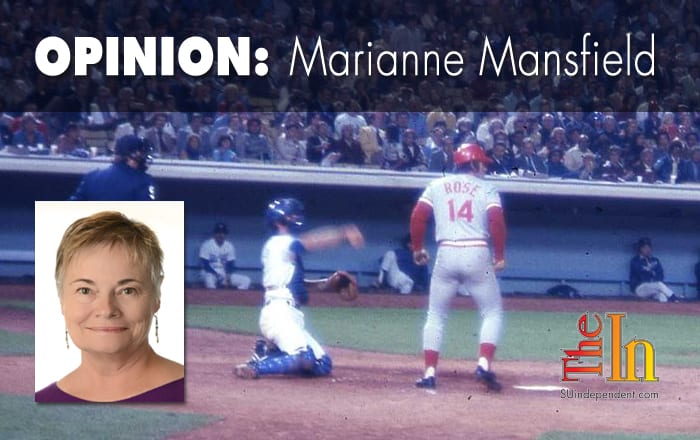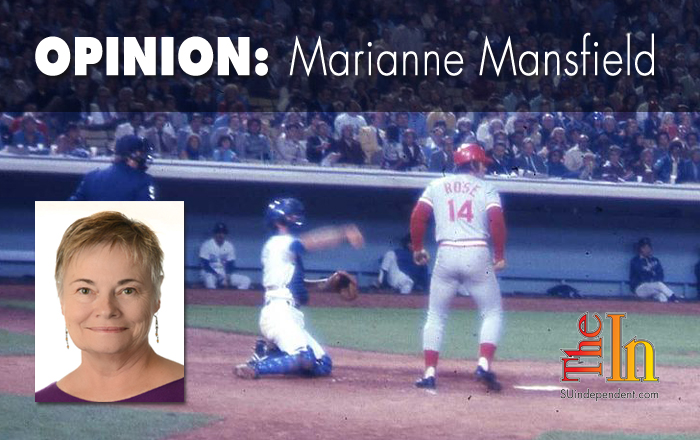Sorry, Charlie Hustle, your place is on the ineligible list.
 |
| Image: W. Marsh |
Written by Marianne Mansfield
Charlie Hustle, aka Pete Rose, took the field at Wednesday’s All Star Game in Cincinnati to a deafening uproar from the hometown crowd. The standing ovation was said to have lasted over 90 seconds. Rose appeared because the fans had voted him one of the “Franchise Four,” the most impactful players in the Cincinnati Reds club history. On the field, he joined fellow players Johnny Bench, Joe Morgan and Barry Larkin. All of these guys seemed to enjoy the spotlight, but Rose seemed desperate to show that he deserved to be there. He waved, grinned and mugged for TV cameras. He high-fived his fellow teammates with an embarrassing gusto that smacked of over-the-top enthusiasm.
Rose seemed singled-minded in purpose and belief: he belonged on that field as much—if not more than—any other player there. This despite the fact that he has been banned for life from participating in Major League Baseball due to his involvement in gambling.
My father was a sports fan. In fact, he wrote a sports column on the side. His nom de plume was Grandstand Sam. The baseball team he followed with near-religious fervor was the Cincinnati Reds. Ergo, the team I grew up idolizing was the Cincinnati Reds. I remember Pete Rose. The enduring image that pops up every time I hear his name is his signature head-first slides into base. My dad and I would hoot with glee each time Rose performed his patented move. His hair would fly wild as he crouched down, driving his stubby legs into the ground for more traction. As he neared his target, he’d launch himself into the air, his body flattened and his arms pointed with the precision of a ballerina, his eye on the prize: the base.
“Now that’s hustle,” Dad and I would tell each other.
My dad died believing that Charlie Hustle had been robbed of his rightful place in baseball’s Hall of Fame. After all, there are many who said then—and many who still agree today—that Pete Rose was one of the greatest men to play the game of America’s pastime.
But does he belong in the Hall of Fame? I found myself wondering about it as I watched him bask in the adulation of the fans at the All Star Game.
The Hall of Fame eligibility rules are deceivingly straightforward. The first four deal with mundane criteria like when and how frequently a player played, how long after retirement he could be considered, and how the case would be handled if a player died before becoming eligible. Of course, Charlie Hustle is very much alive, and he more than fulfills the other standards. It is only the final stipulation that has train-wrecked Rose’s march to the Hall. Specifically, “Any player on Baseball’s ineligible list shall not be an eligible candidate.”
In August of 1989, Bart Giamatti, the then-Commissioner of Major League Baseball, and Peter Edward Rose signed an agreement in which it was declared that Rose would be deemed ineligible for the Baseball Hall of Fame as a disciplinary sanction due to Rose’s alleged involvement in gambling.
There are those—and my father was among them—who argued that Rose was so great, even his gambling shouldn’t be held against him. After all, he almost never bet against his beloved Cincinnati Reds, and unlike the cases of those players who have been found guilty of taking performance enhancing drugs, his gambling never altered his play. In fact, it might have been a spur to launch himself headlong for some of those bases.
And, guys, it’s Charlie Hustle.
And I could almost support that argument but for this fact: If you look at the players who have been put under the ineligible list since its inception under Baseball Commissioner Kenesaw Landis in 1920, the majority of them have been placed there for some form of gambling or associating with gamblers. Other offenses have included bribery and game fixing. Possession and use of drugs does not begin to appear prominently on the list until the early 1990s.
Although Rose spent years denying any wrong-doing, the bulk of evidence against him was persuasive enough to lead Giamatti to bounce him out. Pete joined a list of gamblers and cheaters. And rightfully so.
In 2004, Pete publicly admitted that the allegations were true in a Sports Illustrated magazine interview. He called the claims made against him in the Dowd Report of 1989 the “complete, unadulterated truth.”
So there you have it. Does Pete Rose deserve to be on the ineligible list? He does. He’s guilty. Is he being singled out? No evidence of that. He joins the list of other players found guilty of the same or similar crimes.
But the question at the heart of the matter—and I think in Hustle’s head—is this: Does his greatness rise to such a level that he can be forgiven his crimes?
After all, it’s CHARLIE HUSTLE!
The problem is, it doesn’t matter who it is. Baseball has a history of policing its ranks for unethical behavior and weeding it out when found in a manner that leaves no doubt about the seriousness of the issue.
So sorry, Charlie. Baseball really does want players who play the game with dignity and passion. And who don’t cheat.
And Pete Rose cheated.




